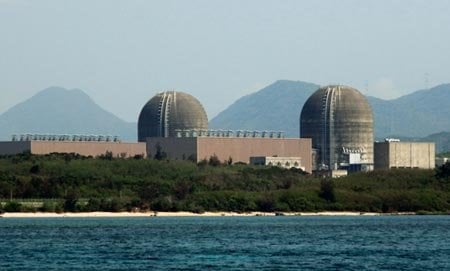LNG Imports Surge As Taiwan Shuts Down Last Nuclear Reactor

Table of Contents
The Nuclear Phase-Out and its Impact on Energy Supply
Taiwan's nuclear energy history is marked by a gradual shift away from reliance on atomic power. Following the 2011 Fukushima disaster in Japan, public confidence in nuclear power plummeted, fueling significant political pressure for a complete phase-out. This was further compounded by concerns over the long-term storage and management of nuclear waste and the inherent risks associated with nuclear technology.
- Decreasing public confidence in nuclear power: The Fukushima disaster profoundly impacted public opinion, leading to widespread protests and demands for a nuclear-free Taiwan.
- Political pressure for renewable energy adoption: The ruling Democratic Progressive Party (DPP) championed a policy shift towards renewable energy sources, viewing nuclear power as unsustainable and environmentally damaging.
- Concerns over nuclear waste disposal: The lack of a permanent solution for storing radioactive waste fueled anxieties and contributed to the anti-nuclear sentiment.
- The resulting energy gap and reliance on imported LNG: The closure of the last nuclear plant created a substantial energy gap, necessitating a significant increase in LNG imports to meet the island's electricity demands.
The immediate consequences of the shutdown included increased electricity prices and a heightened vulnerability to potential blackouts or brownouts, especially during peak demand periods. This underscores the urgent need for a robust and diversified energy strategy.
The Rise of LNG Imports: Sources, Infrastructure, and Costs
To compensate for the loss of nuclear power, Taiwan has witnessed a dramatic increase in LNG imports. This reliance on imported gas has significant implications for the island's energy security and its economic stability.
- Key LNG supplying countries for Taiwan: Major suppliers include Australia, the United States, Qatar, and other LNG-producing nations. Diversification of supply sources is crucial to mitigate risks associated with geopolitical instability.
- Expansion of LNG import terminals and related infrastructure: Significant investments are being made to expand LNG import terminal capacity and bolster the necessary infrastructure to handle the increased volumes of liquefied natural gas.
- The financial implications of increased LNG imports: The cost of LNG imports has fluctuated significantly, impacting electricity prices and creating economic uncertainty. This price volatility necessitates strategies to manage cost fluctuations and ensure affordability.
- Geopolitical implications of reliance on foreign energy sources: Taiwan's increased dependence on foreign LNG suppliers exposes it to geopolitical risks and potential supply disruptions. Strengthening diplomatic ties with key LNG suppliers is paramount.
Furthermore, the environmental impact of increased LNG imports is a significant concern. While LNG is considered a relatively cleaner fossil fuel compared to coal, its combustion still contributes to greenhouse gas emissions, hindering Taiwan's climate goals.
Taiwan's Renewable Energy Transition: Progress and Challenges
Taiwan is actively pursuing a transition to renewable energy sources, aiming to reduce its reliance on fossil fuels and nuclear power. However, this transition faces considerable challenges.
- Current capacity of renewable energy sources: While solar and wind power are growing rapidly, their current capacity is still insufficient to fully replace nuclear and fossil fuel-based electricity generation.
- Government targets for renewable energy integration: The government has set ambitious targets for renewable energy integration, aiming for a significant share of renewable energy in the electricity mix by a specified date.
- Challenges in scaling up renewable energy infrastructure: Scaling up renewable energy infrastructure faces several obstacles, including limited land availability, challenges in grid stability, and integration issues with the existing power grid.
- The role of energy storage solutions: Energy storage solutions, such as pumped hydro storage and battery technologies, are crucial to address the intermittency of renewable energy sources and ensure grid stability.
International collaboration and technology transfer are crucial for accelerating Taiwan's renewable energy transition. Partnerships with countries possessing advanced renewable energy technologies can help bridge the technological gap and facilitate faster deployment of renewable energy solutions.
Diversifying Energy Sources: A Long-Term Strategy
For long-term energy security and price stability, Taiwan must diversify its energy sources beyond LNG. This necessitates a multi-pronged approach:
- Potential for investment in other alternative energy sources: Exploring the potential for geothermal energy, tidal power, and other alternative energy sources can provide additional diversification and reduce reliance on imported fossil fuels.
- Exploring energy efficiency measures: Implementing robust energy efficiency measures can significantly reduce overall energy demand, lessening the reliance on imported LNG and other energy sources.
- International collaborations on energy research and development: Investing in research and development and collaborating internationally can lead to breakthroughs in renewable energy technologies and energy storage solutions.
Conclusion
The shutdown of Taiwan's last nuclear reactor has necessitated a substantial increase in LNG imports, creating both opportunities and challenges for the island's energy future. This transition requires a strategic and multifaceted approach, encompassing the rapid development of renewable energy sources, diversification of energy imports, and investments in energy efficiency. Addressing energy security concerns and minimizing the environmental impact of increased LNG imports are critical for ensuring Taiwan's long-term economic and environmental sustainability. Understanding the complexities of Taiwan's energy transition and the surging LNG imports is vital. Stay informed on the latest developments in Taiwan's energy sector and the implications of its LNG imports for global energy markets. Follow [Website/Blog Name] for further updates on LNG imports Taiwan and the future of clean energy.

Featured Posts
-
 Fp Video Navigating Tariff Turbulence At Home And Abroad
May 21, 2025
Fp Video Navigating Tariff Turbulence At Home And Abroad
May 21, 2025 -
 Marvel Avengers Crossword Clue Nyt Mini Crossword Answers For May 1st
May 21, 2025
Marvel Avengers Crossword Clue Nyt Mini Crossword Answers For May 1st
May 21, 2025 -
 The Essential Wayne Gretzky Fast Facts Stats Records And More
May 21, 2025
The Essential Wayne Gretzky Fast Facts Stats Records And More
May 21, 2025 -
 Plan The Perfect Screen Free Week For Your Family
May 21, 2025
Plan The Perfect Screen Free Week For Your Family
May 21, 2025 -
 Juergen Klopp Bir Efsanenin Yeniden Dogusu Mu
May 21, 2025
Juergen Klopp Bir Efsanenin Yeniden Dogusu Mu
May 21, 2025
